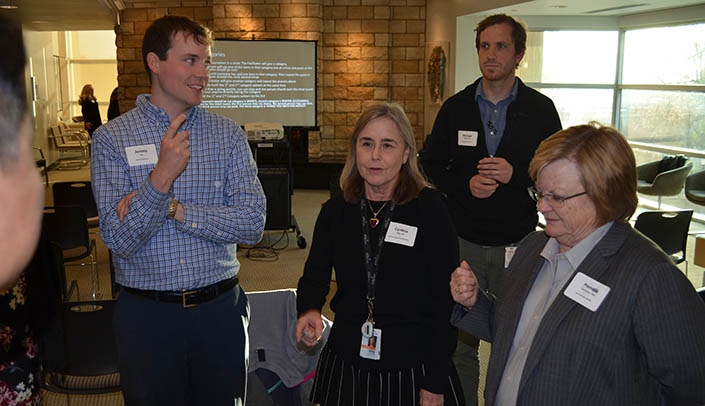In the Linder Reading Room, a “cab driver” and a “passenger,” seated one behind the other, exchange detailed information as a small group of people observe, occasionally breaking in with questions: “How many children does he have?” “Where are you dropping her off?”
The interaction is part of an improvisational exercise — which is part of a five-week series led by Michael Smith, M.D., assistant professor in the UNMC Department of Internal Medicine.
Dr. Smith worked with Linda Love, Ed.D., director of faculty development, and the Patient Experience team from Nebraska Medicine, to create “The Art of Thinking on Your Feet: An Advanced Communication Skills Workshop for High-Stakes Situations.”
Don’t call it improv. Although it kind of is. The aim is to practice high stakes communication skills in a fun and low stakes environment.
Dr. Smith received improv lessons from his wife in 2014. Besides finding them fun, he saw an application for them in the medical arena, specifically in communicating with colleagues and patients.
“When you experience health care, not as someone teaching it, when you experience it yourself, you see things through a completely different lens,” Dr. Love said. “The bottom line is, we want to make a difference in what our patients experience.”
Great communication supports great health care and this experience is part of an ongoing commitment to assuring our communication skills are in top form, Dr. Love said.
The first group — Drs. Smith and Love already are planning another session — included colleagues from both UNMC and Nebraska Medicine.
The class — none of whom realized they would be learning improv — was effusive in their praise of the course.
“We work with different folks on campus, we work with students, and I always want to make sure I come across in the most positive way,” said Theresa Hartman of the McGoogan Library of Medicine.
Andy Grosshans of Nebraska Medicine’s Patient Experience Team called the class a great learning opportunity.
“I can be part of one of the exercises or I can step back and watch as they do it, and watch some of those other small interactions that they’re not even noticing about themselves,” he said. “These exercises are things that are well outside people’s comfort zone in most cases, and because of that, you get to see some behaviors and some uncertainty and discomfort.”
Shaun Grammer will be the course director for communications classes for physician assistant students in the fall.
“I thought this would be a good opportunity to learn some new ideas for the classroom,” he said. “There are a lot of good ideas here, and I thought this would be a good way to work on my communication skills and learn some new techniques to incorporate in my classes.”
“I’m very happy with how the class has taken shape,” Dr. Smith said. “People leave the sessions in a contemplative mode, where they’re reflective about ways that they can improve whatever aspects of that day’s communications were. . . . How can you use these building block skills to be empathetic when it’s difficult?”
The next sessions will be Feb. 8 with external expert Belinda Fu, M.D., a clinical assistant professor in the University of Washington Department of Family Medicine. Faculty can register for either or both of two sessions with Dr. Fu here.
